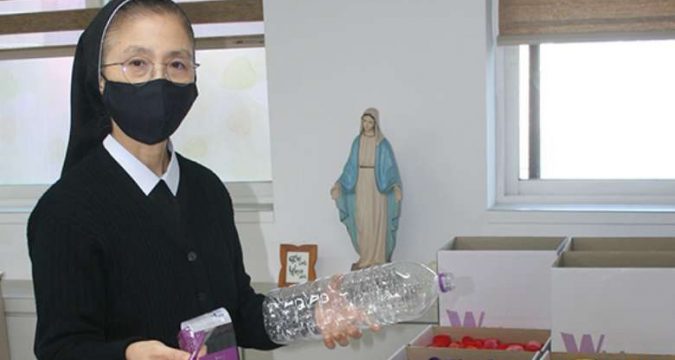
Incheon (UCAN): Diocese of Incheon, South Korea, has been implementing a recycling programme to keep the environment clean and free from waste and pollution since July, the Catholic Times of Korea reported. Father Jeong Seong-il, who heads up of the environmental ministry, said the project was launched after the signing of an agreement with the city authorities in April.
Resource recycling shops run by the diocese’s ministry collect discarded materials from local people and separate them for disposal and recycling. Paper, plastic, vinyl, glass bottles and iron are sorted separately, recycled and then sold to various companies.
Incheon took its cue from Seongnam, a satellite city of Seoul, which introduced a pilot project last year that saw resource recycling stores set up to collect and process disposable materials.
The South Korean government aims to introduce similar projects nationwide to tackle environmental pollution, media reports say.
Father Jeong said the diocese’s project aims to have churches free from waste of disposable items, resources and food.
He also noted that the programme is one of the local Church’s responses “to the cry of the earth” laid out in Pope Francis’ groundbreaking environmental encyclical, Laudato Si’.
The Korean Church launched a seven-year Laudato Si’ action plan last year based on collective action to care for creation in the spirit of integrated ecology that aims for a sustainable world.
Sister Moon Jeom-suk, secretary of the diocese’s environment ministry, described the project as “a green martyrdom, a green revolution and a green mission”
The nun said it is essential to offer more people training in recycling, so the diocese has started environmental education at the Social Pastoral Centre at Dapdong.
Sister Moon said the initiative has added significance as city authorities plan the complete closure of waste landfill in the metropolitan area by 2025.
Incheon, a bustling port city of 2.8 million residents, is a business and transportation hub that also features the ultramodern and huge Incheon International Airport, the largest and one of the busiest in the country.
The city has suffered from moderate to high levels of air and water pollution for years, environmental groups say. In recent times the local government stepped up efforts to tackle pollution, especially improving air quality. In 2017, authorities provided subsidies to replace hundreds of industrial boilers to reduce air pollution and save energy.
Father Jeong noted that while economic activities are a matter of life for cities like Incheon, the current environmental situation in the world is a question of “life and death” for humanity that must be urgently addressed.










